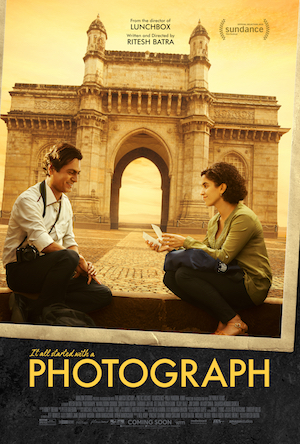
[Rating: Minor Rock Fist Down]

A rom-com that lives in the periphery of the world it creates for itself, Photograph endeavors (yet too often fails) to tell a familiar story without the traditional narrative building blocks of its genre. This is somewhat ironic, too, for the story is steeped in the traditions of its characters, and it’s these cultural imperatives that drive the story forward. Unengaging leads, questionable storytelling choices, and a steadfast refusal to inject anything resembling enthusiasm ultimately sink the effort, however, which is gorgeous to look at, but little else.
Set in bustling Mumbai, the audience meets middle-aged Rafi (Nawazuddin Siddiqui) in front of that city’s Gateway Monument, where he is hawking his services as a photographer for tourists. He pitches his photos as an anchor to a memory: where people will be able to look back on the image and feel the wind and sun just as they do in that moment. This hard sell is an interesting foothold into Rafi as a character, for this sentimentality doesn’t seem to extend to his personal life, where he refuses himself creature comforts so that he can send all his money home to his village. Rafi’s romantic life is even more Spartan, for the audience learns that his grandmother has become so distraught over his bachelorhood that she’s stopped taking her medicine in protest.
Meanwhile in Mumbai, Meloni (Sanya Malhotra) is an upper-class twentysomething woman studying to become an accountant, yet one gets the sense that her heart isn’t entirely in it. Her mind drifts in class, and conversations with her parents reveal that her real passion is theater, not numbers. Unable to voice her opinion on something as mundane as the color of her clothing, she seems utterly incapable of breaking free from her expected path when she meets Rafi during a wandering stroll. Rafi pitches his services and Meloni agrees to have her picture taken, yet she must leave before paying, spooked at the prospect that someone might see her enjoying a private moment of independence.

Tired of fending off calls to get married, and stuck in thought over Meloni’s disappearing act, Rafi writes his grandmother, Dadi (Farrukh Jaffar), to tell her not to worry anymore, that he’s found a girlfriend. When Dadi unexpectedly hops on a train to meet this new mystery woman, Rafi scrambles to find Meloni, who he needs for this new ruse since it was her orphaned picture that he sent to Dadi. Once located, Meloni is surprisingly open to the charade Rafi proposes (though the audience never gets to see him pitch it, a curious script choice), and goes along with the whole drama. With the characters and plot in place, Photograph moves into its second act with well-deserved confidence, yet begins to stumble when assembling the building blocks of the central relationship.
Rafi and Meloni are from different social classes (not to mention generations, as the former is 18 years older than the latter) and are both locked into a destiny determined by older family members. The budding romance between the two unfolds delicately, with neither Rafi nor Meloni confident enough in themselves to admit that the little game they’re playing is developing into something real. Yet rather than explore this emotional journey with its leads, Photograph keeps ducking back into the minutiae of this world, teasing character growth out via conversations with cab drivers or shopkeepers. It’s an indirect approach to the primary thrust of the film (getting Meloni and Rafi together), and while effective in coloring the world these people live in, it doesn’t do the narrative many favors.
And then there’s the leads. Putting aside the 18-year age difference between Rafi and Meloni, which is jarring, there’s just not much of a spark between the two. It’s never really clear what draws Miloni to Rafi, who is a nice man, sure, yet has little else going for him. Likewise, while enigmatic and beautiful, there’s never an exploration of what Rafi finds special about Meloni, who is almost as closed off and shy as her prospective beau. Instead of building these two characters out to demonstrate what makes them special to the other, time is spent fleshing out the world they inhabit, stressing the cultural imperative of their coming together rather than any personal one.

There are some interesting tidbits in here, to be sure, like Rafi’s discovery early on that pretty much the whole of Mumbai is up to speed on his romantic woes due to Dadi’s big mouth, or when Meloni falls victim to food poisoning in an effort to fit in. One gets the sense that writer/director Ritesh Batra is trying to buttress the narrative not by story beats, but rather through these character moments, and for the scenes themselves, they are indeed effective. They don’t connect the dots of the story in a meaningful way, however, and move the story forward only through an expectation that Rafi and Meloni will get together because that’s what SHOULD happen.
Indeed, these characters are so pensive and closed off that it is not only difficult to sympathize with them as leads, their sedated takes on the characters often threaten to put the audience to sleep. Where’s the passion, the carnal imperative to see their relationship blossom? It’s just not here. A rom-com light on the “com” but even more so on the “rom,” Photograph feels more than a little underdeveloped. And while a gorgeous visual palate and brave storytelling choices abound, this one is quick to fade: underexposed and out of focus.





Comments on this entry are closed.